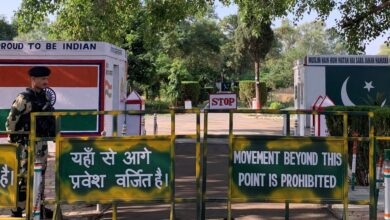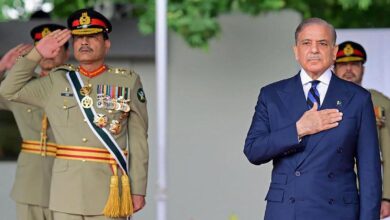India’s 10 BIG crackdowns against Pakistan post Pahalgam terror attack – Indus treaty suspension, import ban | Full List

India vs Pakistan: In the wake of the devastating terror attack in Pahalgam, Jammu and Kashmir, on 22 April-which claimed the lives of 26 people, including a Nepalese national-the Indian government has enacted a series of robust measures targeting Pakistan. These actions are intended to send a clear message regarding India’s zero-tolerance stance on cross-border terrorism and to exert significant diplomatic, economic, and cultural pressure on Islamabad.
1. Complete Ban on Imports from Pakistan
The government imposed an immediate and comprehensive ban on all imports and transit of goods originating from or exported by Pakistan. This measure, announced by the Ministry of Commerce and Industry, aims to close all loopholes, including indirect imports via third countries, effectively halting cross-border trade worth nearly ₹3,886 crore.
2. Prohibition of Pakistani Ships at Indian Ports
India has barred Pakistani ships from docking at any Indian port and vice versa. This maritime embargo, enforced by the Directorate General of Shipping, is designed to safeguard Indian assets and infrastructure, further isolating Pakistan from regional trade routes.
3. Suspension of All Postal Services
All categories of mail and parcels exchanged between India and Pakistan, whether by air or land, have been suspended. Although postal services had been largely inactive since 2019, this formal suspension underscores the current diplomatic freeze.
4. Ban on Pakistani YouTube Channels and Celebrity Accounts
The Indian government has banned 16 Pakistani YouTube channels, including prominent news outlets such as Dawn News and ARY News, for spreading provocative and misleading content. Social media accounts inluding Instagram and X of Pakistani celebrities, including Fawad Khan and Atif Aslam, have also been disabled.
Further politicians like Bilawal Bhutto, Imran Khan and Pakistan PM Shehaz Sharif’s X accounts have also been anned in India.
5. Suspension of Indus Waters Treaty, Simla Agreement
For the first time since its inception in 1960, India has suspended the Indus Waters Treaty, a pivotal agreement on water sharing. This suspension will remain in effect until Pakistan unequivocally renounces support for cross-border terrorism.
A day after India took a series of steps against Pakistan in response to the attack, the neighbouring country on April 24 responded by suspending the 1972 Simla agreement. Signed by Prime Minister Indira Gandhi and Pakistani President Zulfikar Ali Bhutto after the 1971 war, it was considered a crucial peace treaty between India and Pakistan.
6. Closure of the Attari-Wagah Border
The Attari-Wagah border has been fully closed, with all Pakistani citizens on short-term visas ordered to leave India. The move has disrupted the movement of hundreds of people and further severed people-to-people ties.
7. Cancellation of SAARC Visa Exemption Scheme for Pakistanis
India has revoked the SAARC Visa Exemption Scheme for Pakistani nationals, cancelling all previously issued visas and requiring current holders to exit the country within 48 hours. This measure affects diplomats, officials, journalists, and businesspersons.
8. Expulsion of Pakistani Military Advisors
Defence, Naval, and Air Advisors at the Pakistani High Commission in New Delhi have been declared persona non grata and ordered to leave. India is reciprocally withdrawing its own military advisors from Islamabad.
Pakistani nationals residing in India on visas were also given mere 48 hours to leave India. Pakistani spoouses married to Indians have also been sent back to the neighouring country.
9. Reduction of Diplomatic Personnel
India has announced a reduction in its diplomatic staff at the High Commission in Pakistan, scaling down from 55 to 30 personnel, signalling a significant downgrading of diplomatic engagement.
10. Demolition of Suspected Terrorists’ Family Homes
Security forces in Kashmir have demolished at least nine homes belonging to families of individuals wanted for militancy, beginning with that of Lashkar-e-Taiba operative Adil Ahmad Thoker, believed to be involved in the Pahalgam attack.
The Resistance Front (TRF), a shadow group of the banned Pakistan-based Lashkar-e-Taiba (LeT) terror group, claimed responsibility for the attack on the tourists in Baisaran, an off-road meadow in South Kashmir’s Pahalgam.
India vs Pakistan: In the wake of the devastating terror attack in Pahalgam, Jammu and Kashmir, on 22 April-which claimed the lives of 26 people, including a Nepalese national-the Indian government has enacted a series of robust measures targeting Pakistan. These actions are intended to send a clear message regarding India’s zero-tolerance stance on cross-border terrorism and to exert significant diplomatic, economic, and cultural pressure on Islamabad.
1. Complete Ban on Imports from Pakistan
The government imposed an immediate and comprehensive ban on all imports and transit of goods originating from or exported by Pakistan. This measure, announced by the Ministry of Commerce and Industry, aims to close all loopholes, including indirect imports via third countries, effectively halting cross-border trade worth nearly ₹3,886 crore.
2. Prohibition of Pakistani Ships at Indian Ports
India has barred Pakistani ships from docking at any Indian port and vice versa. This maritime embargo, enforced by the Directorate General of Shipping, is designed to safeguard Indian assets and infrastructure, further isolating Pakistan from regional trade routes.
3. Suspension of All Postal Services
All categories of mail and parcels exchanged between India and Pakistan, whether by air or land, have been suspended. Although postal services had been largely inactive since 2019, this formal suspension underscores the current diplomatic freeze.
4. Ban on Pakistani YouTube Channels and Celebrity Accounts
The Indian government has banned 16 Pakistani YouTube channels, including prominent news outlets such as Dawn News and ARY News, for spreading provocative and misleading content. Social media accounts inluding Instagram and X of Pakistani celebrities, including Fawad Khan and Atif Aslam, have also been disabled.
Further politicians like Bilawal Bhutto, Imran Khan and Pakistan PM Shehaz Sharif’s X accounts have also been anned in India.
5. Suspension of Indus Waters Treaty, Simla Agreement
For the first time since its inception in 1960, India has suspended the Indus Waters Treaty, a pivotal agreement on water sharing. This suspension will remain in effect until Pakistan unequivocally renounces support for cross-border terrorism.
A day after India took a series of steps against Pakistan in response to the attack, the neighbouring country on April 24 responded by suspending the 1972 Simla agreement. Signed by Prime Minister Indira Gandhi and Pakistani President Zulfikar Ali Bhutto after the 1971 war, it was considered a crucial peace treaty between India and Pakistan.
6. Closure of the Attari-Wagah Border
The Attari-Wagah border has been fully closed, with all Pakistani citizens on short-term visas ordered to leave India. The move has disrupted the movement of hundreds of people and further severed people-to-people ties.
7. Cancellation of SAARC Visa Exemption Scheme for Pakistanis
India has revoked the SAARC Visa Exemption Scheme for Pakistani nationals, cancelling all previously issued visas and requiring current holders to exit the country within 48 hours. This measure affects diplomats, officials, journalists, and businesspersons.
8. Expulsion of Pakistani Military Advisors
Defence, Naval, and Air Advisors at the Pakistani High Commission in New Delhi have been declared persona non grata and ordered to leave. India is reciprocally withdrawing its own military advisors from Islamabad.
Pakistani nationals residing in India on visas were also given mere 48 hours to leave India. Pakistani spoouses married to Indians have also been sent back to the neighouring country.
9. Reduction of Diplomatic Personnel
India has announced a reduction in its diplomatic staff at the High Commission in Pakistan, scaling down from 55 to 30 personnel, signalling a significant downgrading of diplomatic engagement.
10. Demolition of Suspected Terrorists’ Family Homes
Security forces in Kashmir have demolished at least nine homes belonging to families of individuals wanted for militancy, beginning with that of Lashkar-e-Taiba operative Adil Ahmad Thoker, believed to be involved in the Pahalgam attack.
The Resistance Front (TRF), a shadow group of the banned Pakistan-based Lashkar-e-Taiba (LeT) terror group, claimed responsibility for the attack on the tourists in Baisaran, an off-road meadow in South Kashmir’s Pahalgam.
https://www.livemint.com/lm-img/img/2025/05/06/1600×900/BJP-Protest-6_1746535667228_1746535690276.jpg
2025-05-06 13:24:00






